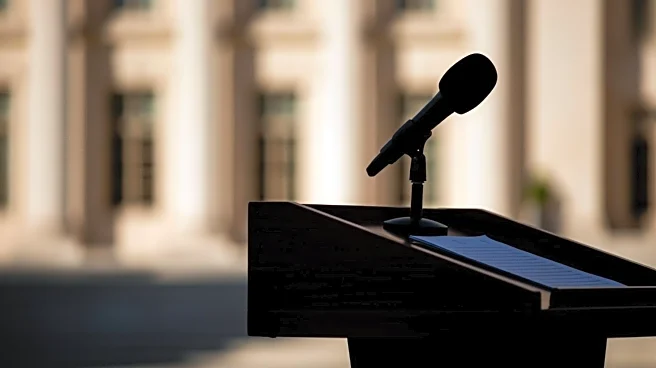What's Happening?
Israeli Prime Minister Benjamin Netanyahu recently spoke with CBS News, discussing the peace plan brokered by President Trump and Arab states following the release of hostages by Hamas. Netanyahu emphasized
the importance of strength in achieving peace and addressed the criticism Israel has faced during the conflict. He acknowledged the painful decision to release nearly 2,000 Palestinian prisoners in exchange for Israeli hostages, noting the strategic advantage gained by Israel in pursuing Hamas. Netanyahu also commented on the civilian casualties in Gaza, estimating a ratio of less than 2 to 1 between civilians and combatants killed. He highlighted the need to conclude the war swiftly to improve Israel's image among young Americans, who have increasingly negative views of the country.
Why It's Important?
The interview sheds light on the complexities of the Israeli-Palestinian conflict and the challenges of implementing a peace plan. Netanyahu's remarks underscore the delicate balance between achieving peace and ensuring security, particularly in the volatile region of Gaza. The release of Palestinian prisoners and the conditions set for Hamas to disarm are pivotal elements of the peace plan, with significant implications for regional stability. The broader impact on U.S.-Israel relations is also notable, as public opinion in the U.S., especially among younger demographics, could influence future diplomatic and military support for Israel. Netanyahu's comments reflect the ongoing struggle to maintain international support while addressing domestic and regional security concerns.
What's Next?
The future governance of the Gaza Strip remains uncertain, with President Trump's peace plan proposing a technocratic committee overseen by a 'Board of Peace.' The plan excludes Hamas from governance, aiming to prevent future conflicts like the October 7th massacre. Netanyahu has ruled out an independent Palestinian state, advocating for Palestinian self-governance without military power. The path forward involves deradicalization and educational reforms among Palestinians. The success of the peace plan hinges on Hamas's disarmament and the establishment of a stable governance structure in Gaza, which could lead to lasting peace and security in the region.
Beyond the Headlines
Netanyahu's interview highlights the ethical and cultural dimensions of the Israeli-Palestinian conflict, particularly the impact of prolonged warfare on public perception and international relations. The emphasis on deradicalization and educational reforms points to long-term shifts in Palestinian society, potentially reducing extremism and fostering coexistence. The interview also reflects the broader geopolitical dynamics, with the involvement of international figures like Tony Blair in the peace process, indicating a collaborative approach to resolving the conflict.









